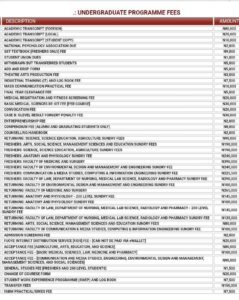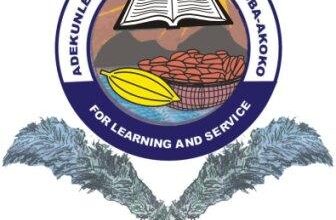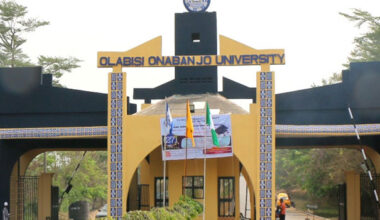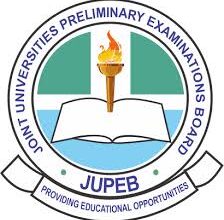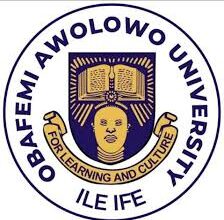Understanding the Undergraduate Programme Fees: A Comprehensive Guide
Choosing a university and preparing for each academic session involves more than just gaining admission. It also requires a clear understanding of the fees you will pay during your stay on campus. The table of Undergraduate Programme Fees released by the university offers a transparent look at every charge that students—both fresh and returning—may encounter. Below is a detailed explanation of these fees, grouped into logical categories to help prospective and current students plan their finances wisely.
1. Academic and Administrative Fees
Several of the listed charges relate directly to academic records, official documents, and administrative services:
-
Academic Transcript (Foreign/Local/Student Copy):
Students who need to send their academic records to institutions outside Nigeria will pay ₦80,000 for a foreign transcript. A local transcript for use within Nigeria costs ₦20,000, while a simple student copy is ₦10,000. These fees cover the cost of processing, verification, and secure dispatch of official records. -
Final Year Clearance Fee (₦5,000):
Before graduating, every student must undergo a clearance process to confirm that they have returned all borrowed items, paid all dues, and met academic requirements. This modest fee ensures that the process runs smoothly. -
Convocation Fee (₦20,000):
Participation in the convocation ceremony—where graduates officially receive their degrees—requires payment of this fee. It helps cover event logistics, gowns, and certificates. -
Case B: O’Level Result Forgery Penalty (₦30,000):
This is a deterrent fee for any student found to have submitted false O’level results. It underscores the university’s zero-tolerance policy on academic dishonesty. -
Add and Drop Form (₦5,000):
If a student needs to adjust their course registration by adding or dropping a subject after initial enrollment, this fee applies. -
Change of Course Form (₦20,000):
Students who wish to change their field of study officially pay this amount to process the new placement. -
Transfer Fees (₦150,000):
Those transferring from another institution into the university pay this fee to cover evaluation of previous transcripts, departmental assessments, and other administrative tasks.
2. Student Welfare and Union Fees
The university also collects small amounts to maintain services that benefit the entire student body:
-
Student Union Dues (₦1,000):
This token fee supports the operations of the student union government, which represents student interests and organizes campus events. -
FUOYE Internet Distribution Service (FIDS) Fee (₦20,000):
A technology fee that helps maintain campus-wide internet connectivity, essential for research, e-learning, and communication. -
Counselling Handbook (₦2,000) and Entrepreneurship Fee (₦2,000):
These cover career guidance materials and entrepreneurial development programs designed to prepare students for life after graduation. -
Compendium Fee (₦8,000):
Paid by alumni and graduating students for the university’s official compendium or yearbook, a cherished record of their time on campus.
3. Departmental and Practical Fees
Many disciplines require laboratory work, field trips, or hands-on training. The university itemizes these so students know exactly what they are paying for:
-
Industrial Training (IT) & Log Book Fee (₦7,500):
Mandatory for students in courses that require practical industry exposure. It covers supervision, log books, and report assessments. -
Mass Communication Practical Fee (₦10,000) and Theatre Arts Production Fee (₦3,000):
These fund studio sessions, production materials, and stage performances. -
Farm Practical/SIWES Fee (₦75,000):
Agriculture students participate in farm practice and the Student Industrial Work Experience Scheme (SIWES); this fee supports farm maintenance and supervision. -
Student Work Experience Programme (SWEP) & Log Book (₦7,500):
Applicable to certain faculties that require industrial attachments or professional placements.
4. Medical and Health-Related Charges
Health and safety are priorities:
-
Medical Registration and Fitness Screening Fee (₦20,000):
Ensures every student undergoes medical examination to confirm fitness for academic life and access to the university clinic. -
Basic Medical Sciences Re-sit Fee (₦30,000 per course):
For students in the medical sciences who need to retake a course.
5. Acceptance and Admission-Related Fees
Once a candidate is offered admission, specific payments confirm the place:
-
Acceptance Fee:
This varies by faculty to reflect program costs.-
Agriculture, Arts, Education, and Science: ₦70,000
-
Communication & Media Studies, Engineering, Environmental Design & Management, Management Sciences, Social Sciences: ₦90,000
-
Basic Medical Sciences, Law, Medicine, and Pharmacy: ₦100,000
-
-
Admission Screening Fee (₦2,000):
Covers the initial screening of applicants’ documents.
6. Faculty-Specific Sundry Fees
One of the most important sections of the table details “sundry fees,” which differ according to faculty and whether a student is a fresher or returning:
-
Freshers:
-
Arts, Social Science, Management Sciences, and Education: ₦190,000
-
Science, Science Education, and Agriculture: ₦190,000
-
Anatomy & Physiology: ₦240,000
-
Faculty of Medicine and Surgery: ₦390,000
-
Environmental Design & Management and Engineering: ₦240,000
-
Communication & Media Studies, Computing & Information Engineering: ₦190,000
-
Law, Nursing, Medical Lab Science, Radiology & Pharmacy: ₦290,000
-
-
Returning Students:
-
Arts, Social Science, Management Sciences & Education: ₦90,000
-
Science, Science Education & Agriculture: ₦90,000
-
Anatomy & Physiology (200 Level): ₦145,000
-
Anatomy & Physiology (Other Levels): ₦190,000
-
Faculty of Medicine & Surgery: ₦265,000
-
Environmental Design & Management & Engineering: ₦165,000
-
Law, Nursing, Medical Lab Science, Radiology & Pharmacy (200 Level): ₦145,000
-
Law, Nursing, Medical Lab Science, Radiology & Pharmacy (Other Levels): ₦135,000
-
Communication & Media Studies, Computing & Information Engineering: ₦90,000
-
These differences reflect the varying costs of laboratory equipment, clinical training, fieldwork, and professional accreditation across disciplines.
7. Other Notable Charges
-
GST Textbook (Freshers Only – ₦9,000):
Covers the General Studies Textbook required for all first-year students. -
Withdrawal but Transferred Students (₦5,000):
For students who withdraw but have their records transferred elsewhere. -
General Studies Fee (Freshers & 200 Level – ₦1,500):
Supports the delivery of General Studies courses for new and sophomore students. -
National Psychology Association Due (₦2,000):
Paid by psychology students to their professional body.
Tips for Students and Parents
-
Budget Early:
Review the faculty-specific sundry fee for your program first. Combine this with acceptance and administrative fees to estimate your total first-year cost. -
Understand Recurring vs. One-Time Fees:
Some charges (e.g., acceptance fee, medical screening, compendium) are paid once, while sundry fees are annual. -
Plan for Practical Components:
If your program requires SIWES, IT, or fieldwork, budget for those practical fees ahead of time. -
Keep Receipts:
Always keep official receipts for every payment; they will be needed for clearance and graduation. -
Avoid Penalties:
Ensure timely and honest documentation to avoid forgery penalties or late registration surcharges.
Final Thoughts
This detailed breakdown highlights the university’s effort to be transparent about the cost of education. While some figures may seem high, especially in medicine or law, they reflect the specialized training, laboratory equipment, and professional resources those programs demand. By understanding each item, students and parents can better plan their finances, avoid surprises, and focus on the primary goal—academic success.